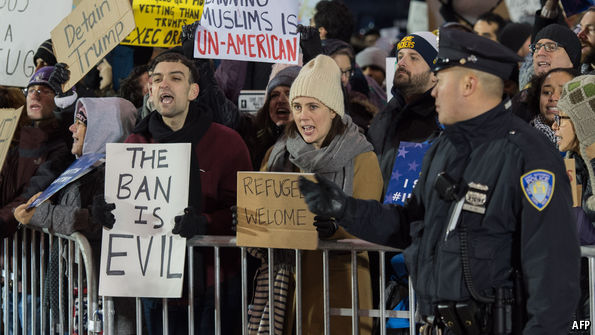Judges block the deportation of Muslim travellers
Sun 29 Jan 2017, 11:48:17

ONE WEEK after his inauguration, Donald Trump received a lesson in the ways of American democracy. The new president suffered his first setback at the hands of the judiciary, a co-equal branch of the federal government that may soon replace the media as his biggest nemesis. A day after Mr Trump issued an executive order (“Protecting the nation from foreign terrorist entry into the United States”) that banned the entry of all refugees and citizens from seven predominantly Muslim countries, federal judges in New York, Virginia and Seattle issued emergency stays that effectively stop a key part of the order in its tracks.
The lawsuit in New York was brought by the American Civil Liberties Union (ACLU) on behalf of two men, Haider Sameer Abdulkhaleq Alshawi and Hameed Khalid Darweesh, and dozens of other “similarly situated” people who arrived at American ports of entry on January 27th just after Mr Trump’s order had taken effect. Mr Alshawi, an Iraqi citizen holding a valid visa who was on his way to Texas to be reunited with his wife and son, was detained by authorities at John F. Kennedy Airport in New York. Mr Darweesh, an Iraqi who had served as an interpreter for the American military, was also stopped at the airport but was later released from detention.
The ACLU claimed that Mr Trump’s order violated two constitutional principles embedded in the Fifth Amendment’s Due Process Clause: “procedural due process” and “equal protection”. The first idea holds that the government may not strip individuals of their liberty without going through proper procedures. “The United States government is obligated by United States and international law”, the ACLU argued, “to hear the asylum claims of noncitizens presenting themselves at United States borders and ports of entry”. It cannot flatly deny refugees and valid visa-holders entry to the country without appropriately considering their claims. “The Immigration and Nationality Act”, the ACLU explained, “provides that ‘[a]ny alien who is physically present in the United States or who arrives in the United States. . . irrespective of such alien’s status, may apply for asylum’.” So even though the individuals involved are not American citizens, they have rights under the constitution that immigration and customs officials are bound to
respect.
respect.
The equal-protection claim was based on Mr Trump’s rather capricious choice of countries in his executive order. The order, the ACLU argued, “discriminates against petitioners on the basis of their country of origin, and without sufficient justification”. There is also little question that the order “was substantially motivated by animus toward—and has a disparate effect on—Muslims, which also violates...equal protection”.
In her brief and unequivocal ruling on the evening of January 28th, Ms Donnelly wrote that Mr Alshawi and Mr Darweesh “have a strong likelihood of success” in showing that their deportation would violate their rights to due process and equal protection. There is “imminent danger”, she wrote, that “there will be substantial and irreparable injury to refugees, visa-holders and other individuals from nations” targeted by Mr Trump’s executive order, should it be fully implemented. Ms Donnelly thus “enjoined and restrained” the government from deporting refugees or “any other individuals from Iraq, Syria, Sudan, Libya, Somalia and Yemen legally authorised to enter the United States”.
The ruling, along with similar non-removal orders from judges in Virginia and Seattle, means that nobody who was told they didn’t belong in America when they arrived on January 27th can be deported—for now—though there were reports from several cities on the night of January 28th that customs officials were disregarding the judges' orders and arranging for individuals to be sent home. It also bears reminding that these rulings are stays, not final determinations. Further judicial hearings in February will determine if the stays should be lifted. And the rulings do not come close to erasing Mr Trump’s executive order; the ban remains in effect for refugees and others who were planning to come to America in the coming days, weeks and months.
Still, the victory in putting the brakes on Mr Trump’s plans for closing off America is not a small one. Emerging from the courtroom in Brooklyn, ACLU executive director Anthony Romero relished the moment. “The courts can work”, he said. “They are a bulwark in our democracy.” When Mr Trump “enacts...executive orders that are unconstitutional and illegal, the courts are there to defend everyone’s rights”.
No Comments For This Post, Be first to write a Comment.
Most viewed from International
Most viewed from World
AIMIM News
Latest Urdu News
Most Viewed
May 26, 2020
Do you think Canada-India relations will improve under New PM Mark Carney?
Latest Videos View All
Like Us
Home
About Us
Advertise With Us
All Polls
Epaper Archives
Privacy Policy
Contact Us
Download Etemaad App
© 2025 Etemaad Daily News, All Rights Reserved.



.jpg)






.jpg)
.jpg)








.jpg)
.jpg)
.jpg)
.jpg)
.jpg)

















